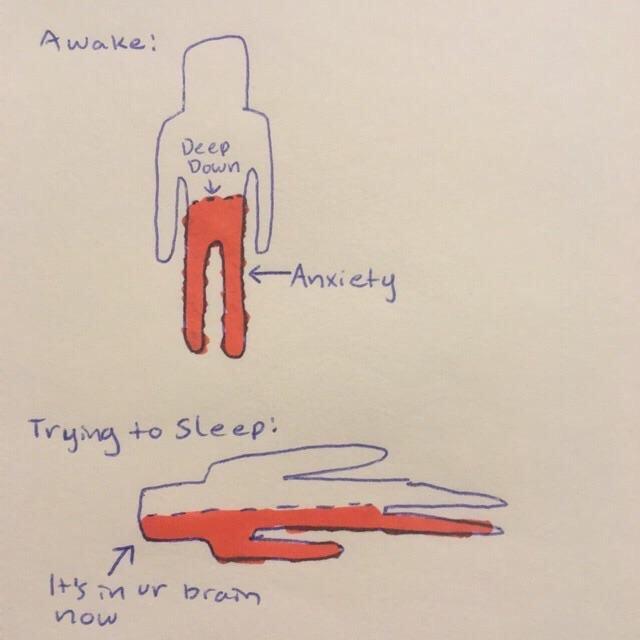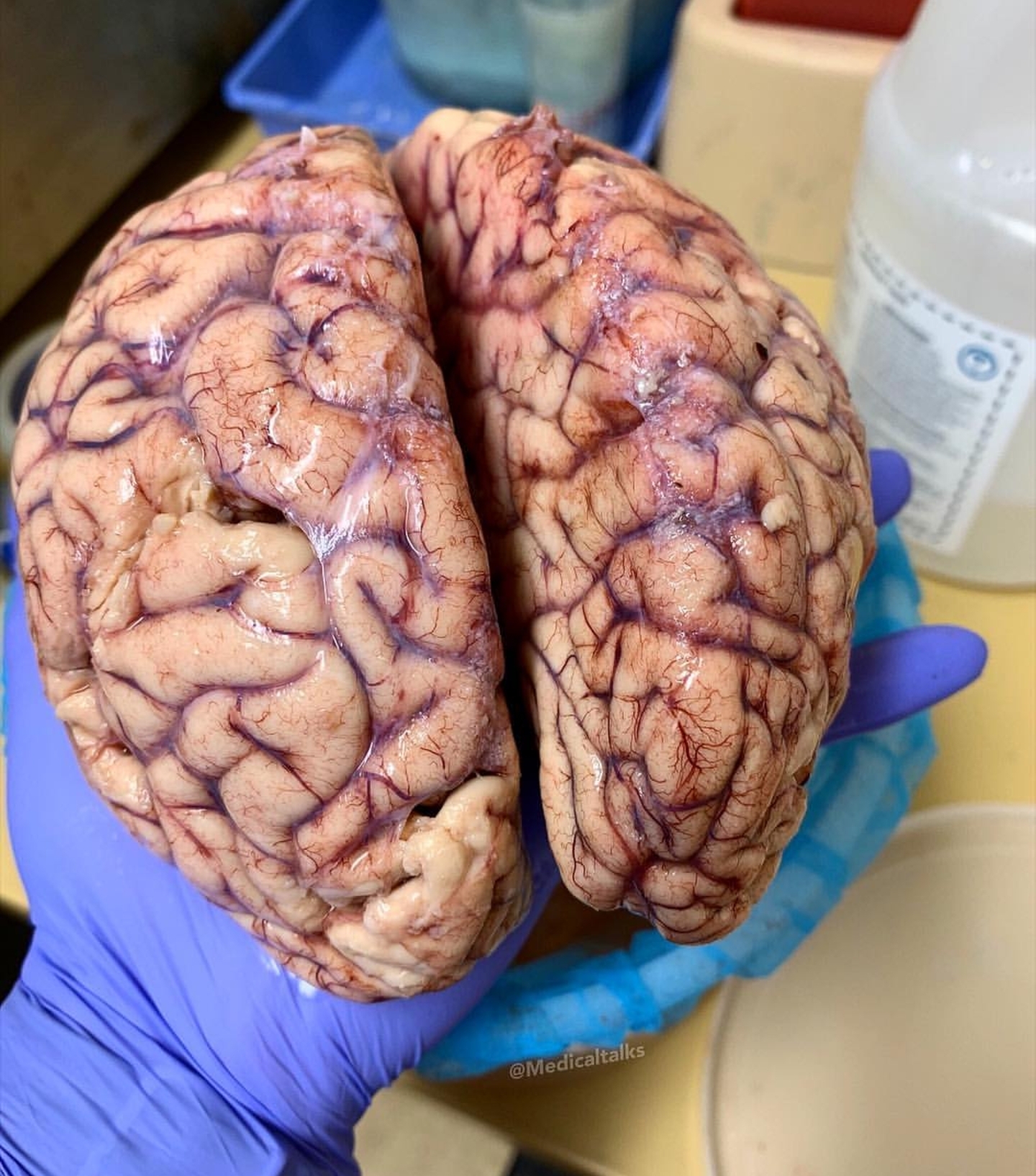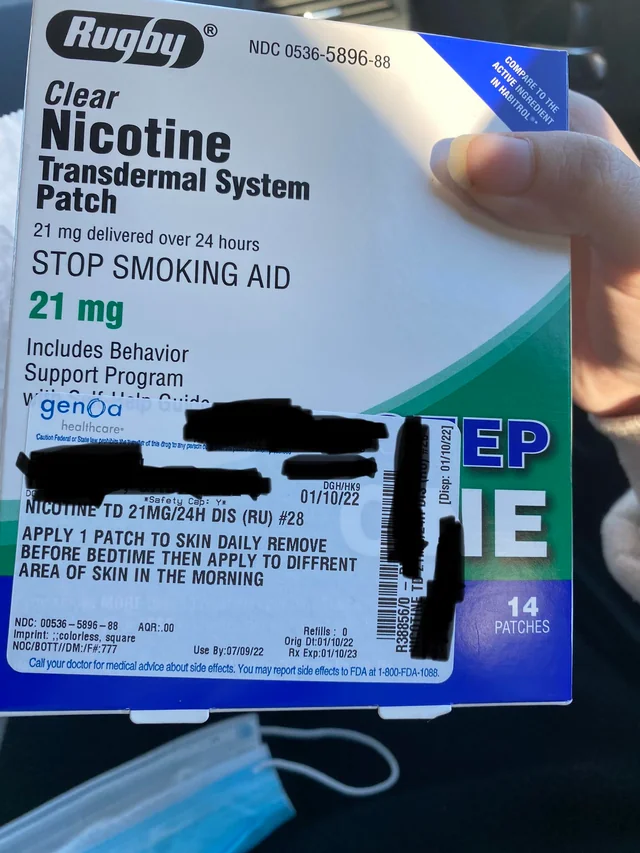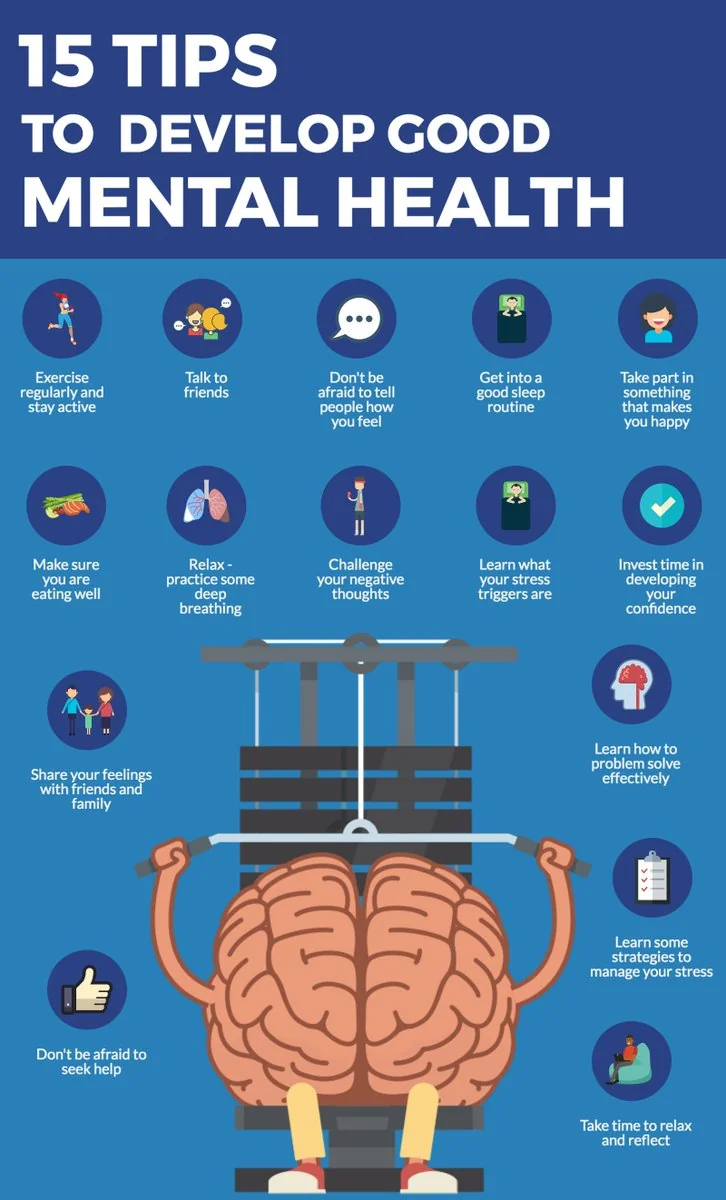1. You feel sad or depressed most of the time
 Image source: Reddit
Image source: Reddit
Beyond feeling sad, depression can manifest as a pervasive sense of hopelessness, emptiness, or despair. It might involve losing interest in activities you once enjoyed, changes in appetite or sleep patterns, and even physical symptoms like aches or digestive issues.
2. You suffer with excessive anxiety
 Image source: Reddit.com
Image source: Reddit.com
Anxiety can become overwhelming, leading to constant worry, fear, or nervousness. Physical symptoms such as rapid heartbeat, sweating, trembling, and difficulty breathing might accompany anxious feelings. Panic attacks, which involve sudden and intense periods of fear or discomfort, can also occur.
3. There are memory lapses
 Image source: Reddit.com
Image source: Reddit.com
Memory lapses can range from forgetting small details to significant events. It might involve short-term memory loss, making it challenging to remember recent conversations or tasks, or long-term memory loss, where important events or information from the past are forgotten.
4. Difficulty in concentrating on a task

Image source: OpenArt
Inability to concentrate can impact various aspects of life, from work to relationships. It might involve trouble focusing on tasks that you have carried out numerous times before and now struggle with, feeling easily distracted, or struggling to follow conversations or instruction.
5. You suffer with mood swings

Image source: Reddit
Rapid shifts in mood can disrupt daily functioning and relationships. Mood swings might involve sudden changes from feeling elated and euphoric, literally feeling on top of the world, to being irritable, angry, or sad without an apparent trigger that may have set if off.
6. Everything irritates you
 Image source: Reddit
Image source: Reddit
Irritability can lead to increased tension in relationships and difficulty in social interactions. It might result in snapping at loved ones, feeling easily annoyed by minor inconveniences, or experiencing heightened sensitivity to noise or disturbances.
7. You're persistently tired

Image source: Reddit
Persistent fatigue can have a huge impact on your day to day life, productivity, mood, and overall well-being. It might involve feeling constantly tired, having minimum energy, even after a substantial rest, and experiencing physical and mental exhaustion.
8. There's changes in your sleep pattern
 Image source: Reddit
Image source: Reddit
Sleep disturbances can disrupt the body's natural rhythm, leading to fatigue and mood disturbances. Insomnia might involve difficulty falling asleep, staying asleep, or waking up too early, while changes in sleep patterns might include oversleeping or restless sleep.
9. Loss of interest in social events
 Image source: Reddit
Image source: Reddit
Losing interest in activities that once upon a time brought joy or fulfilment can indicate underlying issues such as depression or burnout. It might involve withdrawing from hobbies, social events, or spending time with friends and family, making excuses to stay away.
10. You start isolating yourself

Image source: Forbes
Isolating oneself from others can easily exacerbate feelings of both loneliness and depression. It might involve avoiding social interactions, withdrawing from friends and family, or preferring to spend time alone rather than engaging in social activities.
11. Changes in your appetite could be serious
 Image source: Insider
Image source: Insider
Significant changes in appetite can indicate emotional distress or underlying health issues. It might involve overeating as a way to cope with stress or boredom, undereating due to loss of appetite or disinterest in food, or using food as a means of control.
12. You've developed a substance abuse habit

Image source: Business Insider
Substance abuse can develop as a maladaptive coping mechanism for managing stress, anxiety, or emotional pain. It might involve increased use of alcohol, drugs, or other substances to numb feelings or escape reality. It becomes a slippery slope that's hard to get out of.
13. Physical symptoms start showing

Image source: Reddit
Physical symptoms such as headaches, eye strain, muscle tension, stomach problems, or unexplained aches and pains can be manifestations of underlying mental health issues. Chronic stress, anxiety, or depression can manifest physically, impacting overall well-being and quality of life.
14. You have difficulty making decisions

Image source: Reddit
Decision-making difficulties can stem from anxiety, depression, or cognitive impairment. It might involve feeling overwhelmed by choices, fear of making the wrong decision, or lacking confidence in one's judgment. You clam up if someone asks your opinion.
15. You can't handle stress

Image source: Reddit
Difficulty coping with stress can lead to feelings of overwhelm, anxiety, or burnout. It might involve feeling constantly on edge, unable to relax, or experiencing physical symptoms such as headaches, digestive issues, or muscle tension in response to stressors.
16. Your judgement is impaired

Image source: Reddit
Impaired judgment can result in anything from cognitive decline, substance abuse, or emotional distress. It might involve making impulsive or reckless decisions without considering the consequences, engaging in risky behaviors, or disregarding personal safety.
17. A lack of motivation

Image source: Reddit
A lack of motivation can make it challenging to set goals, pursue interests, or complete tasks. It might involve feeling apathetic, disinterested, or lacking the energy and enthusiasm needed to engage in meaningful activities. You prefer to sit there and be miserable.
18. There's feelings of guilt or worthlessness

Image source: Reddit
Feelings of guilt, shame, or worthlessness can erode self-esteem and self-worth. It might involve ruminating over past mistakes, blaming oneself for circumstances beyond one's control, or feeling undeserving of happiness or success. It can creep up and then becomes a real issue.
19. You have suicidal thoughts

Image source: NBC News
Suicidal thoughts are a serious indication of mental distress and should be addressed immediately. They might involve thoughts of self-harm, a desire to escape emotional pain, or feeling like a burden to others. Seek medial intervention or speak to a close friend.
20. A decline in productivity

Image source: Reddit
A decline in performance can be a sign of cognitive impairment, emotional distress, or burnout. It might involve decreased productivity at work or school, difficulty concentrating or remembering information, or receiving negative feedback from peers or supervisors.
21. You become withdrawn from your friends

Image source: Reddit
Withdrawal from social interactions can indicate underlying issues such as depression, anxiety, or social anxiety disorder. It might involve avoiding social gatherings, isolating oneself at home, or withdrawing from previously enjoyed activities due to feelings of insecurity or discomfort around others.
22. Intrusive thoughts start creeping in

Image source: Reddit
Intrusive thoughts are unwanted, distressing thoughts that often involve themes of harm, violence, or danger. They can be persistent and challenging to control, leading to significant distress and anxiety. Common examples include fears of harming oneself or others, disturbing images, or irrational worries about catastrophic events.
23. Psychomotor agitation such as pacing or fidgeting

Image source: Reddit
Psychomotor agitation refers to observable restlessness, fidgeting, or pacing, often accompanied by feelings of inner tension or anxiety. On the other hand, psychomotor retardation involves slowed movements, speech, and cognitive processing, which can be a symptom of depression or other mental health disorders.
24. Difficulty expressing your emotions

Image source: Reddit
Emotional expression difficulties can stem from various factors, including trauma, alexithymia (difficulty identifying and expressing emotions), or mood disorders. It might involve feeling emotionally numb, disconnected from one's feelings, or struggling to communicate emotions effectively with others.
25. Excessive criticism of yourself

Image source: Reddit
Excessive self-criticism often stems from having negative self-perceptions, perfectionism, or internalized beliefs of feeling inadequate. It can lead to a vicious cycle of self-doubt, low self-esteem, and a pervasive sense of never being "good enough."
26. Past events still worry you

Image source: Mom.com
Rumination involves repetitively focusing on negative thoughts, worries, or past events without finding resolution or relief. It can exacerbate feelings of anxiety and depression, impair problem-solving abilities, and contribute to a sense of helplessness or hopelessness.
27. You struggle to take on responsibility

Image source: BuzzFeed
Impaired social or occupational functioning refers to difficulties in fulfilling roles and responsibilities within relationships, work, or academic settings due to mental health symptoms. It might involve conflicts with co workers, declining performance at work or school, or strained interpersonal relationships.
28. You're experiencing hallucinations or delusions

Image source: Reddit
Hallucinations are sensory experiences that occur in the absence of external stimuli, such as hearing voices or seeing things that aren't there. Delusions are false beliefs that are firmly held despite evidence to the contrary. Hallucinations and delusions can be symptoms of psychotic disorders like schizophrenia, mood disorders with psychotic features, or substance-induced psychosis.
29. Difficulty in coping with change

Image source: Reddit
Difficulty coping with change can stem from anxiety, fear of the unknown, or a lack of adaptive coping skills. It might involve feeling overwhelmed by transitions, experiencing heightened stress in response to unexpected changes, or struggling to adjust to new environments or circumstances.
30. Emotional Numbness

Image source: The Guardian
Emotional numbness is characterized by a lack of emotional responsiveness or a diminished capacity to experience feelings or pleasure. It can result from trauma, depression, dissociation, or prolonged exposure to stress. Emotional numbness can impair relationships, decrease motivation, and contribute to feelings of disconnection from oneself and others.
31. Cognitive decline such as memory and problem solving

Image source: Reddit
Cognitive decline refers to a noticeable decrease in cognitive abilities, including memory, attention, language, executive function, and problem-solving skills. It can manifest as forgetting important information, struggling to concentrate on tasks, difficulty finding words, or challenges in making decisions.
32. Your mood fluctuates

Image source: Reddit
Emotional instability involves unpredictable and intense fluctuations in mood, which can be distressing and disruptive to daily life. Individuals may experience rapid shifts from extreme highs to lows, often without a clear trigger. Emotional instability can manifest as frequent mood swings, irritability, anger outbursts, tearfulness, or feeling overwhelmed by emotions.
33. You become paranoid or suspicious

Image source: Reddit
Paranoia involves irrational or exaggerated beliefs that others are plotting against or intending harm toward oneself, even in the absence of evidence or rational basis. Suspiciousness can lead to social withdrawal, strained relationships, and difficulties in trusting others. Paranoia and suspiciousness can be symptoms of psychiatric disorders such as schizophrenia.
34. You're impulsive in a reckless way

Image source: Reddit
Impulsivity refers to acting on urges or impulses without considering the potential consequences, often resulting in risky or harmful behaviors. It can manifest as reckless driving, substance abuse, overspending, gambling, or engaging in unsafe sexual practices.
35. There are psychosomatic symptoms

Image source: Talkspace
Psychosomatic symptoms are physical manifestations of psychological distress or emotional issues, where physical symptoms occur without a clear medical cause. These symptoms can include headaches, stomach aches, chest pain, dizziness, fatigue, or muscle tension, among others.
36. Here's how you can help look after your brain - Regular exercise

Image source: Reddit
Exercise boosts your blood flow to the brain. It stimulates the release of growth factors that promote the formation of new brain cells and connections, and reduces the risk of cognitive decline and neurodegenerative diseases like Alzheimer's or dementia.
37. Try to have a healthy diet

Image source: Reddit
A diet rich in fruits, vegetables, whole grains, lean proteins, and healthy fats provides essential nutrients such as vitamins, minerals, antioxidants, and omega-3 fatty acids that support brain function and protect against oxidative stress and inflammation.
38. Dink LOTS of water

Image source: Reddit
Proper hydration ensures optimal brain function by maintaining fluid balance, facilitating nutrient delivery, and supporting cellular processes. Even mild dehydration can impair cognitive performance and mood. Try to consume around 8 glasses of water every day.
39. Concentrate on quality sleep

Image source: Reddit
Sleep is essential for memory consolidation, learning, cognitive function, emotional regulation, and overall brain health. It allows the brain to repair and rejuvenate itself, promoting optimal mental and physical well-being. It also improves concentration.
40. Mental stimulation for the brain

Image source: Toronto
Engaging in activities that challenge the brain, such as puzzles, crosswords, sudoku, chess, reading, learning a new language, or musical instrument, stimulates neural pathways, promotes neuroplasticity, and helps build cognitive reserve against age-related decline.
41. Keep up the social interaction

Image source: Reddit
Maintaining social connections and participating in social activities allows for emotional well-being, reduces stress, combats loneliness and depression, and supports brain health by stimulating cognitive function and fostering a sense of belonging and purpose.
42. Learn how to manage stress

Image source: Reddit
Chronic stress can negatively impact brain structure and function, leading to cognitive impairment, memory problems, mood disorders, and increased risk of neurodegenerative diseases. Stress-reduction techniques like mindfulness, meditation, yoga, and deep breathing help alleviate stress and promote brain health.
43. Take brain-boosting supplements

Image source: Reddit
Certain supplements, such as omega-3 fatty acids (found in fish oil), vitamins B, C, D, and E, as well as antioxidants like resveratrol and curcumin, have been shown to have neuroprotective properties and support cognitive function. However, it's essential to consult with a healthcare professional before starting any supplement regimen.
44. Limit your alcohol consumption

Image source: Reddit
Excessive alcohol consumption can damage brain cells, impair cognitive function, disrupt neurotransmitter balance, and increase the risk of neurological disorders like dementia and Wernicke-Korsakoff syndrome. Moderation or abstaining from alcohol supports brain health.
45. Quit smoking - you know it makes sense

Image source: Reddit
Smoking constricts blood vessels, reduces oxygen supply to the brain, increases oxidative stress and inflammation, and damages brain tissue. Quitting smoking reduces the risk of stroke, cognitive decline, and neurodegenerative diseases like Alzheimer's and Parkinson's.
46. Get regular mental health check-ups

Image source: Reddit
Routine mental health screenings and check-ups with a mental health professional help identify and address cognitive, emotional, and psychological issues early on, allowing for timely interventions and treatment to promote optimal brain health and well-being.
47. Try brain-healthy hobbies

Image source: Reddit
Engaging in creative activities like painting, drawing, writing, playing a musical instrument, or gardening stimulates different regions of the brain, enhances cognitive function, promotes emotional expression, and fosters a sense of accomplishment and fulfilment.
48. Practice mindful eating

Image source: Reddit
Practicing mindful eating involves paying attention to hunger cues, eating slowly, savoring the taste and texture of food, and being mindful of portion sizes and nutritional choices. Mindful eating supports healthy eating habits, improves digestion, and promotes overall well-being, including brain health.
49. Indulge in brain-training apps

Image source: The Guardian
Brain-training apps and online programs designed to improve memory, attention, processing speed, and cognitive flexibility offer interactive and engaging ways to exercise the brain, enhance cognitive function, and maintain mental acuity throughout life.
50. Don't ignore regular health screenings

Image source: Reddit
Regular medical check-ups, screenings, and evaluations for conditions such as hypertension, diabetes, high cholesterol, cardiovascular disease, and metabolic syndrome help identify and manage risk factors that contribute to cognitive decline, stroke, and neurodegenerative diseases, supporting overall brain health and longevity.
 Image source: Reddit
Image source: Reddit Image source: Reddit.com
Image source: Reddit.com Image source: Reddit.com
Image source: Reddit.com

 Image source: Reddit
Image source: Reddit
 Image source: Reddit
Image source: Reddit Image source: Reddit
Image source: Reddit
 Image source: Insider
Image source: Insider





































